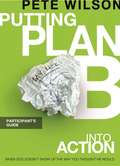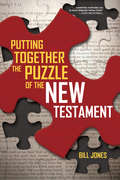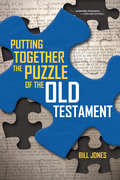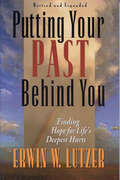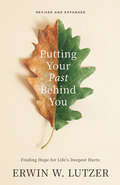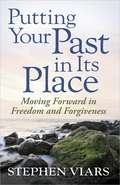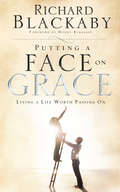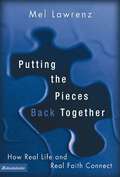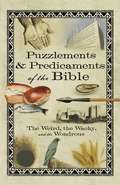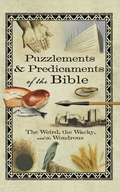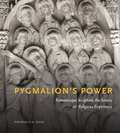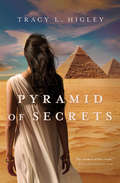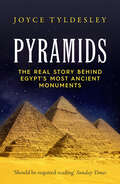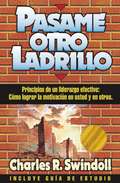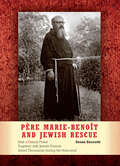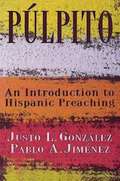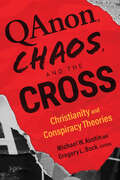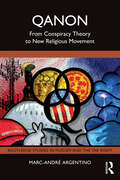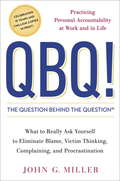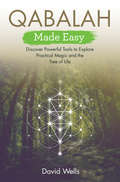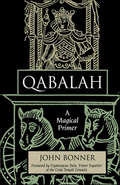- Table View
- List View
Putting Plan B Into Action Participant's Guide
by Pete WilsonYou have a story. So does the guy sitting next to you at Starbucks, the lady in the car next to yours at the stoplight, your best friend, your boss. A story of plans that fizzled, people who let you down, or goals that came to nothing. A story of a time you had to turn to Plan B.So, what do you do with a shattered dream? Or an unmet expectation? How do you accept your Plan B when God doesn't show up the way you thought he would? In his book Plan B, Pete Wilson showed how God often does His best work in our most hopeless situations. In this DVD-based study, Pete shows you how to take the ideas in the Plan B book and appy them to your life. With powerful real-life stories of disappointments and tragedy along with biblical stories and teaching, the Putting Plan B Into Action Participant's Guide will lead you and your small group through the process of discovering the Plan B for your life, accepting your story, and embracing it as your reality. This is your chance to share with and embrace a community of believers to begin a journey of real healing and change.
Putting Together the Puzzle of the New Testament
by Bill JonesWith hundreds of pages of stories, theology and strange visions, who wouldn't feel overwhelmed and confused about the New Testament? How does it all fit together? But imagine that the New Testament was a 1,000 piece puzzle. It's easier to figure out what you're putting together if you have the picture on the box to go by and the corners and straight edges as guides. The chapters in this book provide the puzzle's box cover, corners and straight-edged pieces, demystifying the whole picture of what you are assembling. Armed with these advantages, when you read or study New Testament passages, you will easily understand how the puzzle fits together.
Putting Together the Puzzle of the Old Testament
by Bill JonesWith eight to nine hundred pages of names like Melchizedek, Mephibosheth, Meshelemiah, Michmethath, Mikhtam, who wouldn't feel confused? If the Old Testament were one of those 1,000 piece puzzles, then this book provides the puzzle's box cover so you can understand the complete picture of what you are assembling. It also helps you put together the important four corners and all the straight edged pieces so you have a completed border or reference of the puzzle. Armed with these two advantages, when you read or study Old Testament stories, you will understand how all the pieces fit together. This book is ideal for those who have little or no familiarity with the Old Testament or for pastors and lay leaders to help teach a better understanding of the Old Testament.
Putting Your Past Behind You: Finding Hope for Life's Deepest Hurts
by Erwin W. LutzerAlcoholism. Child Abuse. Divorce. Gluttony. Abortion. Homosexuality. Sexual Addictions. Is there a place to begin again? No one can go back to the starting line in the race of life. What's done, is done. But we are not tied to our past mistakes. By following God's instructions and allowing Him to salve our wounds, we can be freed from the weight of guilt, regret, and bitter heartache. In Putting Your Past Behind You, Dr. Lutzer explains what the Bible says about God's role in the process of separating hurting and discouraged people from their pasts. Come to understand that your trial, addiction, or injustice is not uncommon to man. You aren't facing your hurt alone. God is faithfully standing ready to help, and He almost always uses His people to share in His work of restoration and healing. Many others have struggled with the pain you are feeling. And many have traveled beyond the pain to become blessed servants of Christ. Others have put a past just like yours behind them; so can you.
Putting Your Past Behind You: Finding Hope for Life's Deepest Hurts
by Erwin W. LutzerAlcoholism. Child Abuse. Divorce. Gluttony. Abortion. Homosexuality. Sexual Addictions. Is there a place to begin again? No one can go back to the starting line in the race of life. What's done, is done. But we are not tied to our past mistakes. By following God's instructions and allowing Him to salve our wounds, we can be freed from the weight of guilt, regret, and bitter heartache. In Putting Your Past Behind You, Dr. Lutzer explains what the Bible says about God's role in the process of separating hurting and discouraged people from their pasts. Come to understand that your trial, addiction, or injustice is not uncommon to man. You aren't facing your hurt alone. God is faithfully standing ready to help, and He almost always uses His people to share in His work of restoration and healing. Many others have struggled with the pain you are feeling. And many have traveled beyond the pain to become blessed servants of Christ. Others have put a past just like yours behind them; so can you.
Putting Your Past Behind You: Finding Hope for Life's Deepest Hurts
by Erwin W. LutzerAddiction. Abuse. Broken relationships. Greed. Gluttony. Gossip. Sexual immorality. Decisions made from fear or despair. Is there a place to begin again?We can&’t go back to the starting line in the race of life. What's done is done. But we&’re not tied to our past mistakes. By following God's instructions and allowing Him to heal our wounds, we can be freed from the weight of guilt, regret, and bitter heartache.In Putting Your Past Behind You, Dr. Erwin Lutzer shows how to make a clean break with the past. People just like you have experienced the same trials, addictions, and injustices. Many have traveled beyond the pain to become blessed servants of Christ. God is faithfully standing ready to help, and He uses His people to share in His work of restoration and healing.Find encouragement, wisdom, and new direction as you experience the blessing of a healed past.
Putting Your Past in Its Place: Moving Forward in Freedom and Forgiveness
by Stephen ViarsLives grind to a halt when people don’t know how to relate to their past. Some believe “the past is nothing” and attempt to suppress the brokenness again and again. Others miss out on renewal and change by making the past more important than their present and future. Neither approach moves people toward healing or hope. Pastor and biblical counselor Stephen Viars introduces a third way to view one’s personal history—by exploring the role of the past as God intended. Using Scripture to lead readers forward, Viars provides practical measures to understand the important place “the past” is given in Scripture replace guilt and despair with forgiveness and hope turn failures into stepping stones for growth This motivating, compassionate resource is for anyone ready to review and release the past so that God can transform their behaviors, relationships, and their ability to hope in a future.
Putting a Face on Grace: Living a Life Worth Passing On
by Richard BlackabyComplete the Cycle of Grace How sweet the sound-it saved a wretch like you. It's amazing. But has God's grace changed you? Is it changing others through you? Richard Blackaby explores what may be causing you to miss out on an abundant life of grace, and how simply knowing about it is a far cry from embracing a grace-filled lifestyle. Once you fully experience and grasp its essence, you can't help but "practice" God's undeserved favor by passing it on to everyone around you. Grace shares a close relationship with love, is never static, and is always searching for those willing to receive it. This book focuses on pointed and practical life application so that you can attain the power of gracious living today! Let God's Grace Flow Through You God's grace is so boundless, so contrary to human nature, and so unconditionally given that you will never understand it... ...until you give it away. Get ready to be washed in pure joy, renewed by a fresh sense of gratitude for the rich, undeserved favor God continually bestows upon you. Dr. Richard Blackaby explores what it means to make God's grace a lifestyle and how it will become personal, practical, and recognizable in your life. You'll discover: What genuine grace is and what it is not The power of life words and the devastation of death words The secret to establishing a grace-filled home How to recognize grace-giving opportunities Ways to extend grace when you don't think you can Unable to deny His unconditional love, or even to keep it to yourself, soon grace will have a face. And the reflection in your mirror will tell its story. Amazing Grace, How Sweet the Sound It's a living, breathing testament to the depth of God's love. You don't deserve it, but you've got it. So, what are you doing with God's amazing grace? Many Christians sing of its sweet sound, but fail to extend it to others-missing the point entirely. Putting a Face on Grace provides practical ways you can become a conduit of God's grace to those around you. Dr. Richard Blackaby's personal stories will have you nodding in agreement, laughing with empathetic understanding, and eagerly embracing a new life worth passing on. You will become the essential element that keeps God's life-giving grace flowing. And if you think you're unworthy of such an honor, that's good. That's grace... Story Behind the BookMuch has been said about God's grace. Observing it, defining it, soaking it in. But little has been said about bringing it full circle, to the point where we freely receive and give it on a daily basis. This is what lifestyle grace is all about. Richard Blackaby's book hits a market in need, and "reinvents" grace for us all-exploding our understanding of this tremendous gift and bringing it into a new, tangible dimension.From the Trade Paperback edition.
Putting the Pieces Back Together: How Real Life and Real Faith Connect
by Mel LawrenzIt would be easier, wouldn't it, if all the pieces of life always held together? If it always made sense. If nothing ever broke off. If no part were ever lost, or twisted, or detached. Each chapter of this book touches on a point of human need and leads the reader toward a solid faith conviction that helps make sense of the issues, and points toward the "together" dynamic of life: integration.
Puzzlements & Predicaments of the Bible
by Linda Washington Betsy Todt Schmitt Gene SmillieExplore a new world of biblical adventure and excitement through this entertaining collection of stories. There are many trivia games in society today -- from radio programs and board games to online quizzes and contests. People love those little-known facts that most of the time escape our attention. Puzzlements & Predicaments of the Bible takes great truths of Scripture and translates them into easily learned tidbits of information in an innovative manner. This book will keep readers wanting more as they cover sections, such as "Curious Crimes," "Baffling Behavior," "Sinister Schemes," "Momentous Miracles," and "Exceptional Escapes," as well as chapters titled "The Night Stalker," "A Donkey's Tale," "Dead Man Walking," "Grapes of Wrath," and "A Wife Unmourned." Riveting and compelling, these tales will entertain and inform without fail. Puzzlements & Predicaments of the Bible's fresh approach to the Bible reveals a variety of facts and stories that will have the words jumping off the page, alternately surprising and sobering readers as they are brought to a better understanding of God's Word.
Puzzlements & Predicaments of the Bible
by Howard BooksExplore a new world of biblical adventure and excitement through this entertaining collection of stories. There are many trivia games in society today -- from radio programs and board games to online quizzes and contests. People love those little-known facts that most of the time escape our attention. Puzzlements & Predicaments of the Bible takes great truths of Scripture and translates them into easily learned tidbits of information in an innovative manner. This book will keep readers wanting more as they cover sections, such as "Curious Crimes," "Baffling Behavior," "Sinister Schemes," "Momentous Miracles," and "Exceptional Escapes," as well as chapters titled "The Night Stalker," "A Donkey's Tale," "Dead Man Walking," "Grapes of Wrath," and "A Wife Unmourned." Riveting and compelling, these tales will entertain and inform without fail. Puzzlements & Predicaments of the Bible's fresh approach to the Bible reveals a variety of facts and stories that will have the words jumping off the page, alternately surprising and sobering readers as they are brought to a better understanding of God's Word.
Puzzles of Amish Life: People's Place Book No. 10 (People's Place Bks.)
by Donald KraybillRevised edition! People's Place Book #10. A sociologist provides a way to understand the Amish people's intentional way of living in a world far different from their own. Fun to read. How do the Amish thrive in the midst of modern life? Why do the Amish separate themselves from the modern world? Why do a religious people spurn religious symbols and church buildings? Why is humility a cherished value? Why do a gentle people shun disobedient members? How do the Amish regulate social change? Why is ownership of cars objectionable, but not their use? Why are some modes of transportation acceptable and other forbidden? Why are tractors permitted around barns but not in fields? Why are horses used to pull modern farm machinery? Why are telephones banned from Amish homes? Why are some forms of electricity acceptable while others are rejected? How is modern machinery operated without electricity? Why are some occupations acceptable and others taboo? Why do the Amish use the services of professionals -- lawyers, doctors, and dentists -- but oppose higher education? Why do Amish youth rebel in their teenage years? Are the Amish freeloading on American life? Are the Amish behind or ahead of the modern world?
Pygmalion’s Power: Romanesque Sculpture, the Senses, and Religious Experience
by Thomas E. DalePushed to the height of its illusionistic powers during the first centuries of the Roman Empire, sculpture was largely abandoned with the ascendancy of Christianity, as the apparent animation of the material image and practices associated with sculpture were considered both superstitious and idolatrous. In Pygmalion’s Power, Thomas E. A. Dale argues that the reintroduction of architectural sculpture after a hiatus of some seven hundred years arose with the particular goal of engaging the senses in a Christian religious experience. Since the term "Romanesque" was coined in the nineteenth century, the reintroduction of stone sculpture around the mid-eleventh century has been explained as a revivalist phenomenon, one predicated on the desire to claim the authority of ancient Rome. In this study, Dale proposes an alternative theory. Covering a broad range of sculpture types—including autonomous cult statuary in wood and metal, funerary sculpture, architectural sculpture, and portraiture—Dale shows how the revitalized art form was part of a broader shift in emphasis toward spiritual embodiment and affective piety during the late eleventh and twelfth centuries.Adding fresh insight to scholarship on the Romanesque, Pygmalion’s Power borrows from trends in cultural anthropology to demonstrate the power and potential of these sculptures to produce emotional effects that made them an important sensory part of the religious culture of the era.
Pygmalion’s Power: Romanesque Sculpture, the Senses, and Religious Experience
by Thomas E. DalePushed to the height of its illusionistic powers during the first centuries of the Roman Empire, sculpture was largely abandoned with the ascendancy of Christianity, as the apparent animation of the material image and practices associated with sculpture were considered both superstitious and idolatrous. In Pygmalion’s Power, Thomas E. A. Dale argues that the reintroduction of architectural sculpture after a hiatus of some seven hundred years arose with the particular goal of engaging the senses in a Christian religious experience. Since the term “Romanesque” was coined in the nineteenth century, the reintroduction of stone sculpture around the mid-eleventh century has been explained as a revivalist phenomenon, one predicated on the desire to claim the authority of ancient Rome. In this study, Dale proposes an alternative theory. Covering a broad range of sculpture types—including autonomous cult statuary in wood and metal, funerary sculpture, architectural sculpture, and portraiture—Dale shows how the revitalized art form was part of a broader shift in emphasis toward spiritual embodiment and affective piety during the late eleventh and twelfth centuries.Adding fresh insight to scholarship on the Romanesque, Pygmalion’s Power borrows from trends in cultural anthropology to demonstrate the power and potential of these sculptures to produce emotional effects that made them an important sensory part of the religious culture of the era.
Pyramid of Secrets
by Tracy L. HigleyAn unpredictable Pharaoh. An unprecedented pyramid. An unconscionable murder. When all the gods seem to be failing him, Grand Vizier Hemiunu must seek answers among a mysterious Egyptian sect who claim to worship only the One True God. Hemiunu, Pharaoh's Grand Vizier, orders his life with justice, truth, and precision. In like manner he orders the unprecedented building project with which Pharaoh has entrusted him. But good order is about to be disrupted. When the Overseer of Constructions is found murdered in Pharaoh's slaughterhouse, a murderous spiral begins to unfurl around the pyramid. As the court swells with treachery and the body count rises, Hemiunu finds himself caught between his architectural legacy and his instinct for justice. Meanwhile, troubling facts emerge linking Pharaoh's wife and the mysterious People of the One, a sect who "worship only one god, whom they say has no name that man knows, yet is the only god, the creator of everything." When Hemiunu finds himself in the company of these strange people, his spiritual certainties begin to wither along with his professional dreams.As his long relationship with Pharaoh strains under the weight of his task and the tug of his conscience, Hemiunu faces a disturbing choice: follow the evolving spiritual philosophies that guide his life, or honor the Pharaoh whose friendship and nepotism control his fate.
Pyramids: The Real Story Behind Egypt's Most Ancient Monuments
by Joyce TyldesleyThe extraordinary mysteries of the pyramids - revealed From the development of monumental architecture around 3,000 BC to the fabulous edifices that rose up from the desert plains of Giza, these are amongst the most remarkable structures in world history. Their story has given rise to a set of incredible legends: spaceships, ley lines, mysterious goings on… Is it fact or fiction? Joyce Tyldesley, writer, lecturer and broadcaster on Ancient Egypt, cuts away modern myth and prejudice to reveal the truth behind these astonishing structures. The Old Kingdom pharaohs believed that death was the beginning of eternal life. To help them on their way they built pyramids; huge ramps or stairways charged with the most potent magic, leading directly to the sky. Pyramids chronicles how and why Egypt’s pharaohs built on so grand a scale, and shows how the pyramids helped to build Egypt itself. ‘A fascinating survey… For anyone who wants to know about pyramids, this is required reading’ Spectator ‘Tyldesley sets out to fill the gap between Egyptologists’ reserve, the excesses of tour guides and misinformed traditions… [she] should be required reading.’ Sunday Times
Pásame otro ladrillo
by Charles R. SwindollUna relación contemporánea del ejemplo y las experiencias de Nehemías, para la formación de líderes.
Père Marie-Benoît and Jewish Rescue: How A French Priest Together With Jewish Friends Saved Thousands During The Holocaust
by Susan ZuccottiSusan Zuccotti narrates the life and work of Père Marie-Benoît, a courageous French Capuchin priest who risked everything to hide Jews in France and Italy during the Holocaust. Who was this extraordinary priest and how did he become adept at hiding Jews, providing them with false papers, and helping them to elude their persecutors? From monasteries first in Marseille and later in Rome, Père Marie-Benoît worked with Jewish co-conspirators to build remarkably effective Jewish-Christian rescue networks. Acting independently without Vatican support but with help from some priests, nuns, and local citizens, he and his friends persisted in their clandestine work until the Allies liberated Rome. After the conflict, Père Marie-Benoît maintained his wartime Jewish friendships and devoted the rest of his life to Jewish Christian reconciliation. Papal officials viewed both activities unfavorably until after the Second Vatican Council (Vatican II), 1962-1965.To tell this remarkable tale, in addition to her research in French and Italian archives, Zuccotti personally interviewed Père Marie-Benoît, his family, Jewish rescuers with whom he worked, and survivors who owed their lives to his network.
Púlpito: An Introduction to Hispanic Preaching
by Justo L. Gonzalez Pablo A. JimenezIn this, the only book available that addresses the distinctive issues and character of preaching in the Hispanic congregation, the authors discuss important historical, theoretical, and methodological issues in Hispanic homiletics. Includes ten sermons.
QAnon, Chaos, and the Cross: Christianity and Conspiracy Theories
by Edited by Michael W. Austin and Gregory L. Bock&“What is truth?&” said jesting Pilate, and would not stay for an answer. —Francis Bacon Although Christians are followers of the Truth, many find themselves tempted by the alternate &“truths&” offered by conspiracy theories. Christianity and conspiracy theories have had a long, complicated relationship. But today conspiracy theories are bringing our already polarized society to the brink of chaos. QAnon, the Big Lie, and anti-vaccination theories thrive online, disrupting faith communities. This timely essay collection explores the allure of conspiracy theories and their consequences—and ultimately offers gospel-based paths forward. Accessible to all concerned believers, QAnon, Chaos, and the Cross features scholars of religion, ethics, and public life on the following topics: • evaluating evidence and forming beliefs • the Satanic Panic of the 1960s–1990s • understanding scientific methodology • conspiracy theories&’ appeal to those searching for meaning • the consequences of social media and echo chambers • productive dialog with people who hold different opinions • intellectualism in the life of faith • conspiracy theories in Scripture • QAnon&’s religious rhetoric Complete with a guide to reasoning, which outlines both logical fallacies and intellectual virtues, QAnon, Chaos, and the Cross is an indispensable resource for all Christians seeking the truth. Contributors:Chase Andre, Michael W. Austin, Bradley Baurain, Daniel Bennett, Gregory L. Bock, Chad Bogosian, Kevin Carnahan, Jason Cook, Scott Culpepper, Stephen Davis, Garrett J. Deweese, Marlena Graves, Shawn Graves, David Horner, Dru Johnson, Nathan King, Rick Langer, Christian Miller, Timothy Muehlhoff, Michelle Lynn Panchuk, Susan Peppers-Bates, Steven Porter, Kaitlyn Schiess, Aaron Simmons, Domonique Turnipseed, Rachel I. Wightman, Keith Wyma, Eric Yang
QAnon: From Conspiracy Theory to New Religious Movement (Routledge Studies in Fascism and the Far Right)
by Marc-André ArgentinoThis book explores the QAnon movement by examining its history, fluctuations, and evolution, stemming from the likelihood of multiple users behind the “Q” account, as well as from the changes in the sociopolitical landscape since the creation of the movement. It frames QAnon as a lived religion and demonstrates that it has gone through three stages of existence: proto-QAnon, canonical-QAnon, and apocryphal-QAnon.Author Marc-André Argentino argues that QAnon evolved into something more than a conspiracy theory and demonstrates through a comparative analysis that QAnon is more akin to a new religious movement, in particular a hyper-real religion. He explores the role of gender and women in the QAnon movement, followed by an examination of how the QAnon conspiracy theories have legitimized and coordinated targeted gender-based violence. The book provides evidence of the nexus of QAnon and ideologically-motivated violent extremism and criminality. Finally, it examines the evolution of QAnon after the January 6th insurrection, the loss of the 2020 election by Donald Trump, and the disappearance of “Q.” This volume will be of great interest to researchers of conspiracy theories, new religious movements, American politics, and extremism.
QBQ! The Question Behind the Question®
by John G. MillerNow, more than ever, the absence of personal accountability in our culture is a problem that has led to a proliferation of shunning responsibility, blaming others, and playing the victim. In times of political and social upheaval around the world, it appears that few are immune, as they look to explain-and complain-about the state of our affairs. This remarkable and timeless book gives a practical and inspiring message for putting personal accountability into daily action, with astonishing results.
Qabalah Made Easy: Discover Powerful Tools to Explore Practical Magic and the Tree of Life
by David WellsDiscover how to use the spiritual teachings of the Tree of Life to learn more about yourself, improve your experience on Earth, and fulfill your life purpose.The Qabalah is a Western non-religious mystic tradition (differing from the Kabbalah, which is an aspect of Jewish mysticism) offering teachings on the nature of divinity, the creation, the origin and fate of the soul, and the role of human beings. It consists of meditative, devotional, and mystical practices, including astrology, tarot, and magic. The central organizational system of the Qabalah is the Tree of Life - a mystical symbol consisting of ten interconnected spheres and considered to be a map of the universe and the psyche, the order of the creation of the cosmos, and a path to spiritual illumination.This introductory book breaks down the ideas of the Tree of Life into an easy to follow path, and shows how to use it effectively in our lives. Readers will learn:- the meaning of each of the spheres- a ritual and a meditation for each sphere- the gods, archangels, crystals, and magical tools connected to each sphere and how to work with them- how to set up a personal temple and create their own magical symbol- how to chant the Qabalistic prayer to draw down the Archangels for protection This book was previously published in the Hay House Basics series.
Qabalah for Wiccans: Ceremonial Magic on the Pagan Path
by Jack ChanekExplore the Tree of Life from a Pagan Point of ViewYou don't have to shy away from Qabalah anymore—this book makes it easy to use ceremonial magic and incorporate its symbolism into your Wiccan rituals and workings. Join Jack Chanek on an exploration of Hermetic Qabalah and learn how its concepts can be interwoven with the essential elements of Wicca.Featuring an abundance of journal prompts, exercises, and correspondences, Qabalah for Wiccans is the ideal resource for understanding Qabalah as a Pagan practitioner. You'll uncover Qabalistic connections to Wiccan theology, ascend the Tree of Life through meditation and ritual, and explore the Tree's ten Sephiroth using the four elements, tarot, and more. Revealing many similarities between the two practices, this remarkable book shows you how Qabalah works and why it matters to your Wiccan path.Includes a foreword by Deborah Lipp, author of Magical Power for Beginners
Qabalah: A Magical Primer
by John BonnerWhile it began as a mystical interpretation of Jewish scriptural texts, today Qabalah is much more. As John Bonner writes in his introduction, "Qabalah is a metaphysical philosophy, or rather a theosophy, that sets out to answer a series of vital questions regarding the nature of God, His creation, and the place of man in His divine plan." It is a living, growing system of personal development. In addition, much of contemporary Western magick is founded on the work of the Hermetic Order of the Golden Dawn, which based its ritual and teachings firmly in Qabalah. This scholarly introduction explores the mysteries of Qabalah through the symbolism of the Tree of Life and its four distinct elements: the three Pillars of Manifestation, the ten Holy Sephiroth, the Paths that run to and from the Sephiroth, and the Veils. For each Sephirah, Bonner provides detailed information on magical, astrological, and tarot correspondences - as well as how different religious traditions relate to the concepts contained in each.
